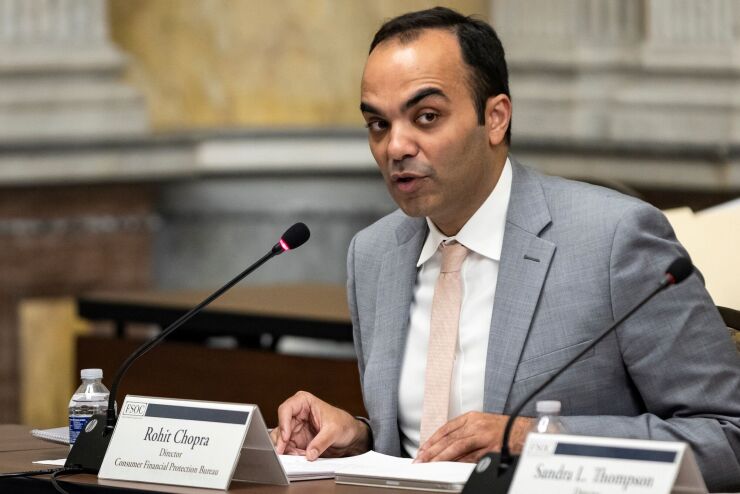
The Consumer Financial Protection Bureau is proposing an interpretive rule that would classify payroll advances as consumer loans subject to annual percentage rates and fee disclosures, a move that could upend
On Thursday, the CFPB is expected to issue new guidance that would subject paycheck advance products to the federal Truth in Lending Act. Earned wage access companies that ask for tips or charge fees — typically from about $1.99 to $4.99 — would have their business models upended by the rule, experts said. Employers that market the products as a benefit to employees and that charge no fees or tips would be exempt from the guidance.
CFPB Director Rohit Chopra said that products that stand between workers and their wages "typically work in favor of the employer and against the worker," because some workers take on debt to meet daily and unexpected expenses.
"Delays between work and pay can drive consumer demand for other forms of debt like credit card debt, payday loans and other costly credit," Chopra said Wednesday on a conference call with reporters to explain the guidance. "This can lead to a treadmill of debt that keeps getting faster and faster. When delays in payments to workers get longer, it can exacerbate the problems people face and trap them in cycles of debt."
Consumers take out an average of 27 paycheck advance loans a year, according to Thursday's report, and paycheck advances charge annual percentage rates of 109.5% on average, the CFPB said. The majority of costs for payroll advances come from fees that are charged to get expedited access to the funds, the CFPB said.
The new guidance would reverse progress that the earned wage access industry has made in
The current proposal makes clear that if workers obtain money and they are required to repay it through a paycheck reduction, then that money is a loan under existing federal law, Chopra said.
"In today's economy, most people don't get paid until days or weeks later. That means that American workers are essentially giving a free loan to their employers," Chopra said.
"In all 50 states, we expect companies to comply with the Truth in Lending Act," a CFPB official said. "Based on our reading, as proposed today, paycheck advanced products need to comply with TILA because they are credit. Whether or not additional disclosure requirements for usury caps are applied by virtue of state law, that's a question for state legislatures and regulators."
Earned wage access providers use technology to access payroll data and calculate an employee's earnings since the start of a pay period. They provide the employee access to some or all of their wages with the amount deducted from the employee's next paycheck.
The CFPB is working with federal and state regulators to ensure that emerging paycheck advance companies "are playing by the rules," Chopra said. "For those that cheat or egregiously violate the law, we will not hesitate to take enforcement actions.''
He also said the bureau plans to reach out to employers to explain the benefits of free access to the products and "to caution them about accepting kickbacks that paycheck advance providers may someday offer."
Chopra said the CFPB wants companies that offer free payroll advance products directly to consumers or through employer-sponsored plans to expand them while refraining from charging fees that push workers into taking on more debt. He also said there is confusion when companies suggest consumers pay them tips, most of which are required.
"A large portion of Americans are confused about the changing nature of tipping in America, and tipping your lender or tipping your employer is especially odd," Chopra said.
The interpretive rule is open for public comment through August 30, a CFPB official said.






